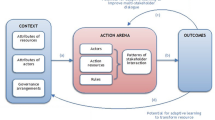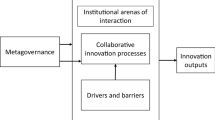Abstract
Projects may exist in many forms, depending on the purpose and organisational context. Irrespective of the type and nature, however, the effective management of any project requires a high degree of commitment by the project members to the accomplishment of project objectives. The high degree of reliance on external international funding makes project management in non-profit organisations of developing societies a challenging task. The marriage of two entirely different sets of values and philosophical orientations creates an invisible tensile force, impacting the different stages of the project life cycle. The present paper, which is exploratory in nature, broadly aims to study the impact of sponsors’ values on the different project-management activities, including both the planning and the implementation stages of the project. The research involves conceptualisation of the different significant issues in effective project management. The analysis of the identified issues is first made on the basis of the experience of the selected stakeholders in Tanzanian non-profit organisations. The analysis is further linked to the selected context-specific contemporary philosophical thoughts affecting the socio-cultural values in the region. The analysis shows that the variation in the values of project owners and stakeholders is one of the major challenges in the effective implementation of a project in the given context. The study is novel in its approach and raises some fundamental issues arising due to the different philosophical orientations and value-sets of the different partner-project organisations. It is expected that the study will stimulate further academic debate on the broader theme of ‘values, philosophy and project management’. The study is also likely to contribute to knowledge development in the subject area of management in general and practical management philosophy in particular.
Similar content being viewed by others
References
Ludovic-Alexandre Vidal and Franck Marle, 2008, ‘Understanding Project Complexity: Implications on Project Management’, Kybernetes 37(8), p. 1,094.
Ibid., p. 1,095.
Rami Olkkonen and Pekka Tuominen, 2006, ‘Understanding Relationship Fading in Cultural Sponsorships’, Corporate Communications: An International Journal 11(1), p. 64.
Richard Tambulasi and Happy Kayuni, 2005, ‘Can African Feet Divorce Western Shoes? The Case of “Ubuntu” and Democratic Good Governance in Malawi’, Nordic Journal of African Studies 14(2), p. 148.
Dalene M. Swanson, 2007, ‘Ubuntu: An African Contribution to (Re)search for/with a “Humble Togetherness”’, Journal of Contemporary Issues in Education 2(2), p. 55.
Barbara Nussbaum, 2003, ‘African Culture and Ubuntu: Reflections of a South African in America’, World Business Academy Perspectives 17(1), p. 2.
Tambulasi and Kayuni, ‘Can African Feet Divorce Western Shoes?’, op. cit.
Maurice Muhatia Makumba, 2007, An Introduction to African Philosophy: Past and Present, Nairobi: Paulines Publications Africa, p. 140.
Viktoria Stöger-Eising, 2000, ‘Ujamaa Revisited: Indigenous and European Influences in Nyerere’s Social and Political Thought’, Africa: Journal of the International African Institute 70(1), p. 130.
Julius K. Nyerere, 1962, ‘Ujamaa’: The Basis of African Socialism, Dar es Salaam: Tanganyika African National Union, p. 8.
See, for example, Peter F. Drucker, 1990, Managing the Non-Profit Organization, Oxford: Butterworth-Heinemann; Albert Caruana, B. Ramaseshan and Michael T. Ewing, 1998, ‘Do Universities that Are More Market Oriented Perform Better?’ International Journal of Public Sector Management 11(1), pp. 55–70; Robert F. Hurley and G. Tomas M. Hult, 1998, ‘Innovation, Market Orientation and Organizational Learning: An Integration and Empirical Examination’, Journal of Marketing 62, pp. 42–54; Van R. Wood, Shahid Bhuian and Pamela Kiecker, 2000, ‘Market Orientation and Organizational Performance in Non-for-Profit Hospitals’, Journal of Business Research 48, pp. 213–26; Alan R. Andreasen and Philip R. Kotler, 2007, Strategic Marketing for Non-Profit Organizations, 7th Ed., Upper Saddle River, New Jersey: Prentice Hall; and Isabel Maria Macedo and José Carlos Pinho, 2006, ‘The Relationship between Resource Dependence and Market Orientation: The Specific Case of Non-Profit Organisations’, European Journal of Marketing 40(5/6), pp. 533–53.
Macedo and Pinho, ‘The Relationship between Resource Dependence and Market Orientation’, op. cit.
Eddie Kilkelly, 2009, ‘Blended Learning: Pathways to Effective Project Management’, Development and Learning in Organizations 23(1), pp. 19–21.
Nils O. E. Olsson and Knut Samset, 2006, ‘Front-End Management, Flexibility and Project Success’, Paper presented at Project Management Institute Research Conference, Montreal, 17–19 July 2006; as cited by N. O. E. Olsson et al., ‘Project Ownership: Implications on Success Measurement’, Measuring Business Excellence 12(1), pp. 39–46.
Nils O. E. Olsson, Agnar Johansen, Jan Alexander Langlo and Olav Torp, 2008, ‘Project Ownership: Implications on Success Measurement’, Measuring Business Excellence 12(1), pp. 39–46.
Project Management Institute, 2000, A Guide to the Project Management Body of Knowledge, Newton Square, Pennsylvania: Project Management Institute, p. 16.
Kirsten Foss and Nicolai J. Foss, 1999, ‘Understanding Ownership: Residual Rights of Control and Appropriable Control Rights’, DRUID Working Paper No. 99-4, Danish Research Unit for Industrial Dynamics, Aalborg University, Aalborg, Denmark.
Barry Witcher, Gordon J. Craigen, Dennis Culligan and Andrew Harvey, 1991, ‘The Links between Objectives and Function in Organizational Sponsorship’, International Journal of Advertising 10(1), pp. 13–21; and Richard R. Dolphin, 2003, ‘Sponsorship: Perspectives on its Strategic Role’, Corporate Communications: An International Journal 8(3), pp. 173–86.
Tambulasi and Kayuni, ‘Can African Feet Divorce Western Shoes?’, op. cit., p. 148; and Timothy Murithi, 2006, ‘Practical Peacemaking Wisdom from Africa: Reflections on Ubuntu’, The Journal of Pan African Studies 1(4), pp. 25–34.
Nussbaum, ‘African Culture and Ubuntu: Reflections of a South African in America’, op. cit.; and Swanson, ‘Ubuntu’, op. cit.
Swanson, ‘Ubuntu’, op. cit., p. 55.
Richard H. Bell, 2002, Understanding African Philosophy: A Cross-Cultural Approach to Classical and Contemporary Issues, New York: Routledge (as cited in Swanson, ‘Ubuntu’, op. cit., p. 54); and Swanson, ‘Ubuntu’, op. cit.
Makumba, An Introduction to African Philosophy, op. cit., p. 140.
Aleck Humphrey Che-Mponda, 1984, ‘Aspects of Nyerere’s Political Philosophy: A Study in the Dynamics of African Political Thought’, African Study Monographs 5, pp. 63–74.
Benjamin James Inyang, 2008, ‘The Challenges of Evolving and Developing Management Indigenous Theories and Practices in Africa’, International Journal of Business and Management 3(12), pp. 122–132; and Gbolahan Gbadamosi, 2003, ‘HRM and the Commitment Rhetoric: Challenges for Africa’, Management Decision 41(3), pp. 274–80.
Low Sui Pheng and Ben S. K. Lee, 1997, ‘“Managerial Grid” and Zhuge Liang’s Art of Management: Integration for Effective Project Management’, Management Decision 35(5), pp. 382–391.
Inyang, ‘The Challenges of Evolving and Developing Management Indigenous Theories and Practices in Africa’, op. cit., pp. 128–129.
Author information
Authors and Affiliations
Corresponding author
Rights and permissions
About this article
Cite this article
Amon Kimeme, J., Tripathi, S.K. The Influence of Sponsors’ Management Philosophy on Project Management in Tanzania: An Analysis of Critical Issues in Internationally Funded Projects. Philos. of Manag. 12, 71–87 (2013). https://doi.org/10.5840/pom201312213
Published:
Issue Date:
DOI: https://doi.org/10.5840/pom201312213




